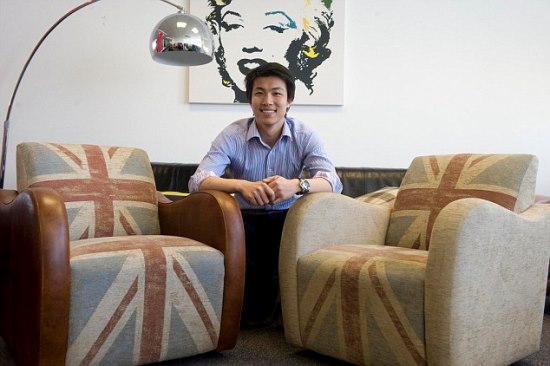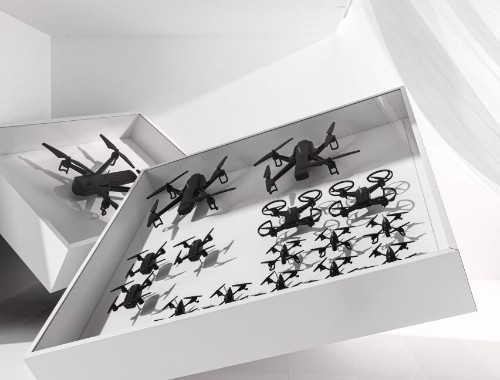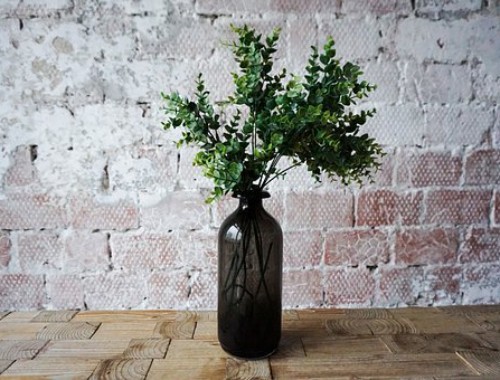Online furniture boss gunning for Ikea: He set up shop just six years ago, but man behind Made.com is thinking big
Source:thisismoney.co.uk
They are in fact a new showroom for Made.com, the online furniture brand set up by Chinese-French entrepreneur Ning Li in London’s Notting Hill six years ago. Despite the quirkiness, Made.com – whose name will be familiar to Londoners from the many adverts on the Tube – is a serious business.

The online furniture brand Made.com was set up by Chinese-French entrepreneur Ning Li in London’s Notting Hill six years ago
During a sticky summer evening in Paris, beautiful people are congregating in an exquisitely designed space near the Place des Victoires, one of the most rarefied fashion districts of the French capital.
A DJ, dressed in a black glittery shark mask and matching mini-dress, is playing tuneless avant-garde music.
An all-female dance troupe, clad in sequined Andy Warhol-inspired frocks are throwing shapes and moving their limbs out of rhythm.
Of all the places to interview a chief executive, this has to be one of the most improbable.
The premises, built in rough-hewn style in a traditional Paris courtyard with lots of exposed concrete and glass, look like an art gallery.
They are in fact a new showroom for Made.com, the online furniture brand set up by Chinese-French entrepreneur Ning Li in London’s Notting Hill six years ago.
Despite the quirkiness, Made.com – whose name will be familiar to Londoners from the many adverts on the Tube – is a serious business.
‘We employ 250 people, 200 of them in London, and we are in seven countries – UK, Ireland, France, Italy, Netherlands, Belgium and Germany,’ says Ning.
His aim, he explains, is to offer high quality design but still at an affordable price – achieved by cutting out the middle man: an upmarket version of Ikea.
‘When I wanted to furnish my first flat, I was going to buy a sofa that cost around €3,000. Then I realised the sofa was made by a factory owned by a friend of mine that I grew up with in China.
'He was a furniture expert and he told me they produced the sofa for $300, so there was a huge mark-up.
‘It sounds simple to go direct to the factory but actually it is really hard to do it. You can’t just place an order with a factory for one or two things, you need the volume, and the internet gives you the volume. The saving then can be passed to the customers.’
Some people might quail at the idea of making a relatively pricey purchase like furniture online, without necessarily having seen it first, unless they can get to a showroom.
Best-selling items may be good value, but they are not low cost: a Wes sofa costs from £899 to £1,499 depending on size and upholstery material.
One solution to the online jitters is Made Unboxed, where customers put photographs of Made.com items in their home up on a website.
Other users can see how the furniture works in real life, and add their comments – no-one was being rude when I looked.
If you fancy yourself as an arbiter of taste, you can use the site to show off to the world – and for those with an inquisitive streak, it’s an easier way of taking a peek through the keyhole than craning your neck from the top deck of the bus to get a glimpse inside of strangers’ windows.
‘It gets customers involved and reassures them about how things can look in a real home,’ says Ning.
It certainly seems plenty of people are quite happy to buy furnishings on the internet: revenues rose 63 per cent in 2014 – the most recent figures available – to £43million.
The company is profitable in the UK, Ning says, but has yet to record a profit overall because he is choosing to invest in overseas expansion.
Made.com is aiming at buyers across Europe who want cool, modern furniture for their homes at a reasonable price, whether they are thirty-something singletons buying their first flat, or empty-nesters in their fifties, who have finally thrown out their kids’ junk and want to go minimalist.
Despite being Chinese and living in France at the time, Ning decided to set up Made.com in London at the suggestion of one of his backers, Brent Hoberman, who is best known as the co-founder of internet travel site Lastminute.com.
No doubt Hoberman will be hoping Made.com will be a smoother ride than Lastminute, which is seen as the archetypal company of the UK’s tech boom and bust in the early 2000s.
With operations across Europe, Ning admits he would have preferred a Remain vote in the recent EU referendum.
But he adds: ‘Brexit doesn’t change anything business wise, because we are selling well-designed furniture at bargain prices and that dynamic will not change.’
His hope is that Britain retains its traditional hospitality to talented people from overseas after a Brexit – as indeed is the intention of Brexiteers who want the UK to do more trade with the rest of the world rather than relying on the moribund eurozone.
‘A lot of tech entrepreneurs like myself are foreign immigrants,’ says Ning, ‘I hope free trade and openness continue, because that is what makes London and the UK great.’
M ade.com seems all very well for trendy types who are confident in their design savvy. But traditionally Britain has not been famed for its flair at interior decor, with many homes full of shabby dog-haired sofas and three flying ducks on the wall.
So what about people who have no taste?
‘We can do a lot for them. We pre-select, we edit for them. Actually, I think British people have always been interested in design, but the barrier was price and availability. The internet has resolved both those things.’
Designers such as Colbert might be a big leap for some, but helping young designers has been part of the firm’s philosophy.
‘Many big brands didn’t want to work with young talent in the recession because of the risk – but we decided to and our business has grown along with them,’ Ning says.
He and his co-founder, Frenchman Julien Callede, considered floating Made.com on the stock market 18 months ago but opted for a private fund raising instead.
‘That is the right thing for our business at this stage. In the long term, who knows?’ he muses.
His ambition now, is to turn Made.com into an Ikea for middle-class customers with money to spend and modern tastes, who want to break away from over stuffed sofas and chintz.
‘Ikea is the only international brand in furniture and we think we have the right ingredients to do the same, we want to be a global brand but with a new face for our time.
'If you want to buy a cheap coffee table, you can. What we want to do is make it possible for that table to be beautiful too.’
(Source: thisismoney.co.uk Author: Ruth Sunderland)





 沪公网安备31010402003309号
沪公网安备31010402003309号



